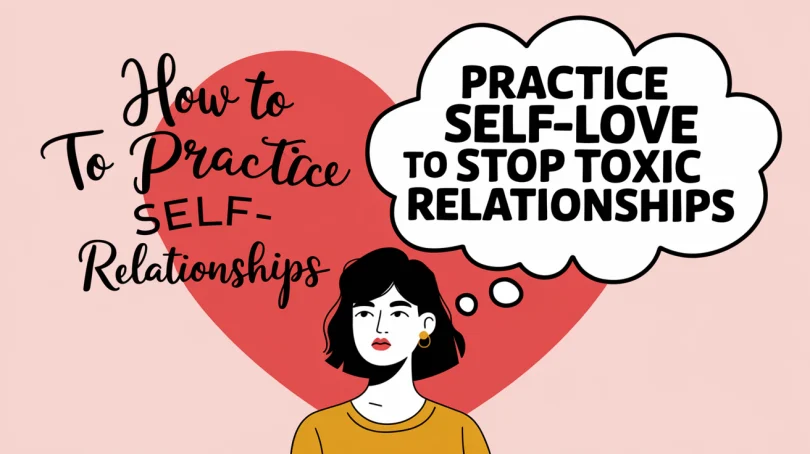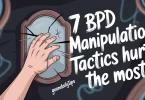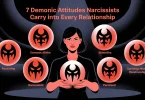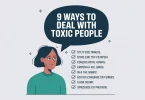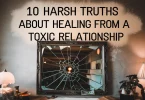Self-love isn’t about affirmations, mantras, or positive thinking. Deep down, you never fully believe those things because what’s stopping you from truly loving yourself is a deeply internalized negative energy that lives in your body. This energy needs to be healed so you can love yourself from a real, authentic place. This transformation will not only change your relationship with yourself but also ensure you never accept breadcrumb situationships or emotionally unavailable partners again. Today, I’ll show you how to make self-love a natural reflex a part of who you are.
My Self-Love Journey
In the picture I’ve shared, you can see my self-love journey. On the left, I’m forcing a fake smile, struggling with self-abandonment, low self-esteem, and jumping from one unhealthy relationship to the next. On the right, I’m free from the energy that once stopped me from loving myself. I’ve grown a strong connection to my authentic self and now know what I need to feel loved and how to meet those needs myself.
How to Deal with Harsh Truths in Relationships
The Path to Self-Love: Building an Internal Ally
The path to self-love requires you to build an ally within yourself. This means forming an internal allegiance with all parts of who you are so you can work together in harmony with both self-discipline and self-compassion. A good mix is 50% self-compassion and 50% self-discipline, depending on what’s going on in your life and what you need to act in a way that’s truly right for you.
Right now, there are parts within you that are blocking your ability to show up for yourself and love yourself. These parts aren’t your allies yet they’ve gone rogue. They’re acting out on their own, prioritizing familiarity and certainty over growth and discomfort. I call these inner parts protectors.
Why Protectors Exist
These protectors formed as coping mechanisms during your childhood. If you grew up in a chaotic, uncertain, or unsafe environment, these parts arose to keep you psychologically safe. For example, if you experienced emotional neglect or abandonment, your inner protectors developed to help you navigate that lack of safety.
The innate child response is to assume, “It’s because of me that I’m not getting the love I need.” This assumption gives you a sense of control in a situation where you otherwise have none. However, the aftermath of this assumption is toxic shame believing you need to change to be worthy of love.
The Role of Protectors
Protectors prioritize familiarity and safety over growth. They include:
- The Inner Critic: This part criticizes you as a defense mechanism to protect you from potential failure, rejection, or harm. It anticipates failure so you don’t have to experience it in real time.
- The Inner Perfectionist: This part controls your environment to create a sense of certainty amidst chaos. It often teams up with the inner critic to keep you “safe.”
- The Inner People Pleaser: This part prioritizes others’ needs over your own to maintain safety and connection in an inherently unsafe environment.
- The Inner Caregiver: This part takes responsibility for others’ emotions to feel valued and secure, often stemming from being parentified as a child.
These parts believe they’re protecting you, but they block your ability to love yourself because they prioritize others over you.
How Protectors Sabotage Your Life
These protectors create friction within you, leading to patterns like:
- Attracting unhealthy or toxic relationships.
- Being highly critical of yourself.
- Comparing yourself to others.
- Having no boundaries due to fear of rejection.
- Seeking external validation.
- Holding onto past mistakes.
These patterns make it impossible to truly love yourself.
How to Heal and Build Self-Love
Affirmations and positive thinking don’t work because they don’t address the nonverbal trauma stored in your body. To heal, you need to access and release this frozen energy.
The RAIN Tool
RAIN is a tool I’ve developed to help you access and heal this trauma. Here’s how it works:
- Recognize: Identify which part is coming up for you. Is it your inner critic, perfectionist, people pleaser, or caregiver? Notice the thoughts, feelings, and sensations in your body.
- Allow: Hold space for this part. Let it speak without judgment or identification. Welcome it instead of pushing it away.
- Investigate: Connect to the physical sensations in your body. Ask this part what it needs to feel safe or loved.
- Nurture: Give this part the love it never received. Picture yourself as an adult nurturing your younger self. This is called reparenting.
Barriers to Healing
- Overthinking: If you’re used to intellectualizing your healing, it can be hard to connect to your body. Be patient and practice RAIN to learn the language of your body.
- Blocking Love: Your protectors block your ability to receive love. If you struggle with the nurturing step, ask all your parts to take a step back to create space for healing.
